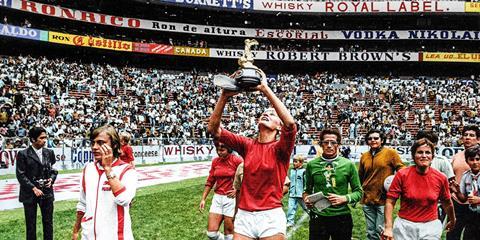Topical documentary examines the systemic sexism surrounding the 1971 Women’s World Cup in Mexico

Dirs. Rachel Ramsay, James Erskine. UK. 2023. 91mins
It may have been made with an eye on the Women’s World Cup this year but, even still, Rachel Ramsay and James Erskine’s soccer documentary — executive produced by Venus and Serena Williams and US player Alex Morgan – could hardly be timelier. Cataloguing the appalling sexism surrounding women’s football, and official attitudes which clearly still exist today (cf Spain’s Jenni Hermoso), this story of a Women’s World Cup footballing tournament which took place in Mexico in 1971 opens Toronto Film Festival’s documentary section and is an easily-digestible, not-too-forensic crowdpleaser which will, like its protagonists, run and run.
An easily-digestible, not-too-forensic crowdpleaser
The feature debut of Ramsay, and Erskine’s follow-up to Billie (2019), Copa 71 gets the story across through its talking heads (former competitors at the event and later, more famous players, alongside a football historian) together with some surprisingly vivid archival footage and newspaper headlines. It is a smooth TV-friendly watch which will be highly attractive to prestige streamers, including those involved in sports broadcasting. Copa 71 may have a packaged air to it, but the story speaks – loudly – for itself.
Some of the facts still remain fuzzy to the end, but the Women’s World Cup of 1971 catalogued here, which took place in Mexico City, was actually the second such event — largely an Italian-proposed initiative, the first played out in 1970 with seven teams competing around Turin. Buoyed by the success of these games, the Federation Of Independent European Female Football proposed the Mexican tournament in 1971 (six teams). To say FIFA, headed at the time by the almost cartoonishly-pompous Brit Sir Stanley Rous, was unimpressed is an understatement. Spitefully, the women’s sides were not even allowed play in official stadiums, meaning they could only turn out in Mexico’s largest venues — but the tables were turned when a record 110,000 spectators showed up for the final, giving lie to the idea that women’s football was an unpopular spectator sport.
In fact, women had been banned outright from playing soccer in the UK since the 1921 – a ruling only lifted in 1970. And when the English side returned from Mexico in 1971, they got a further three-month ban from the FA, with their revolutionary coach, Harry Batt, receiving a life-time suspension. The reaction to the tournament’s success was nothing short of vindictive, and there would not be another women’s tournament for two decades: when you think of it, Luis Rubiales is not the only man who needs to apologise.
But, look, here they are in 1971, in all their mullet-haired glory – sponsored by Italian liquor brand Martini & Rossi, young girls (one British player was 13 years-old) and women emerging from planes to be shocked by the avid crowds that followed their ramshackle buses around Mexico City. Ramsay and Erskine have tracked down some of the players, including the hot headed Elena Schiavo, the tournament’s best striker, England’s captain Carol Wilson, the Danish winners and Mexican fighters for fair-pay (another ongoing problem). Yet the best part of the film is footage of the game itself: some players fought dirty and passions ran high. These are not women who felt they had to perform to a more polite level than the men; they were scrappers, and the field was all the more entertaining for it — explaining the crowds.
After a brief VO from Serena Williams, Ramsay and Erskine choose to frame the film with US icon Brandi Chastain being shown footage of the event and professing her total ignorance of it. This does seem strange: she played in the next Woman’s World Cup in 1991 in China. The story of Mexico has been re-told may times. But perhaps history is not her forte. The on-the-nose soundtrack also leans heavily on crowd favourites like Nancy Sinatra (1966’s ’These Boots…’ etc) when most of the players here look like they would have been more comfortable at a Bay City Rollers concert.
The heady delights of the Mexican pitches were not to be repeated for these players, who returned to indifference and exclusion. Copa 71 prefers to end on a positive note, though, instead of anger at the injustices of the past. It’s a crowdpleaser, like those record-breaking matches. One hopes, though, that pleasing, often so close to appeasing, can be removed from the equation going forward: Copa 71 is a positive step along that route.
Production companies: Newblack Films, Westbrook Studios
International sales: Dogwoof, Katie@dogwoof.com
Producer: Victoria Gregory, Jannat Gargi, Anna Godas
Screenplay: Rachel Ramsay, James Erskine, Victoria Gregory
Cinematography: Angela Neil
Editing: Arturo Calvete, Mark Roberts
Music: Rob Lord
























